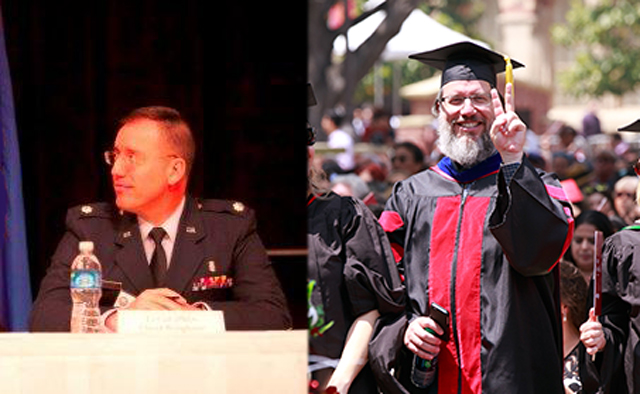David Bringhurst served in the military on the front lines – in a battle for mental health. And as a Clinical Associate Professor in the Suzanne Dworak-Peck School of Social Work, his experience in mental health care and program leadership is prized by students interested in the field of military and veteran social work.
David joined the military simply because it seemed like a great opportunity. As an active duty social worker in the United States Air Force, he provided psychotherapy and treatment for mental illness, domestic violence and substance abuse. He also led programs on suicide prevention and family maltreatment prevention and treatment. David’s personal “great opportunity” turned out to be improving psychological health and resilience of countless airmen and their families.
The breadth of his service – and level of responsibility he was given – shows in where he was stationed:
- 1992-1995 Vandenberg Air Force Base, CA (Chief, Social Work Services)
- 1995-1998 Fairchild Air Force Base, WA (Chief, Alcohol and Drug Abuse Prevention and Treatment)
- 1998-2001 Misawa Air Base, Japan (Mental Health Clinic Flight Commander)
- 2001-2002 Minot Air Force Base, ND (Mental Health Clinic Flight Commander)
- 2002-2005 University of Utah (Air Force Institute of Technology scholarship for his PhD)
- 2005-2008 Randolph Air Force Base, TX (Chief, Air Force Family Research)
- 2008-2011 Randolph Air Force Base, TX (Chief, Air Force Wounded Warrior Program)
- 2011-2013 Joint Base Andrews, MD (Chief, Behavior Health Branch; Suicide Prevention Program Manager; Director of Psychological Health for the Air National Guard (ANG) – all within the ANG Surgeon General’s office)
Standing out amid his military career, David says his time in charge of the Air Force Wounded Warrior program was most rewarding. David was tasked with hiring care managers to consult wounded warriors on disability pay, compensation, medical care navigation, housing, service animals and more. He was the face of the program, presenting at national conferences and providing input as the Air Force Wounded Warrior Program spokesperson to the Pentagon on policy and program requirements. All this meant he would connect with wounded warriors themselves in one moment – and then be in touch with the White House and other high level offices in the next to advocate for their needs. Most memorably, he even had a chance to brief the Secretary of the Air Force on the Air Force Wounded Warrior Program.
From his time with the military, David says he learned leadership, humility, collaboration, negotiation, teamwork, flexibility, service and integrity. He retired from active service after 21 years, but his experience and expertise is still invaluable to the new population he serves – students. Fittingly, David now teaches the Military Social Work electives at the Dworak-Peck School. Real world examples? He won’t run out of them anytime soon.
Employees, and veterans or service members – what’s your story?
Do you know a veteran who could bring expertise and skills that USC could use? Refer a qualified veteran and get a $500 bonus – learn more HERE.
